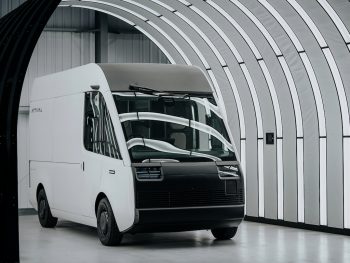Electric vehicle start-up Arrival has produced its first battery electric van from its Bicester microfactory, marking a “big stepping stone” to at-scale production.

Revealed last year, the Arrival Van is intended to revolutionise the commercial vehicle sector with its “outstanding total cost of ownership and robust design” and will be trialled by UPS. The delivery giant announced in January 2020 that it had ordered 10,000 electric commercial vehicles from Arrival for use in the UK, Europe and North America.
But Arrival’s production methods are also just as revolutionary. Its microfactories eschew the traditional OEM format for large plants and instead focus on localising the supply chain and adopting cell-based robotic assembly instead of a traditional automotive production line. Such a decentralised method of making electric vehicles means the microfactories are said to require lower capital expenditure to establish, shorter commissioning times and to be more environmentally friendly than traditional methods of production.
Arrival also used in-house technologies, including composite materials, autonomous mobile robots, in-house components and a “software-defined factory” to produce its first electric van.
Denis Sverdlov, founder and CEO at Arrival, said: “Today is an important day for Arrival. This is the first time a vehicle has ever been built in our microfactory, using a new method that does not use a traditional assembly line. Although we have not yet achieved serial production, we are focused on making it happen. We will continue to produce vehicles in our microfactory in order to master at-scale production.”
Sverdlov also noted that the process had been “more difficult than we had initially imagined” and thanked the team for the” immense amount of effort, technology, innovative breakthroughs, and problem solving”.
Further information will on Arrival and its plans will be announced at its Q3 earnings webinar on Tuesday 8 November 2022.
Earlier this year, the firm announced plans to slash costs and potentially cut up to a third of staff “in response to the challenging economic environment”. It’s also put its plans for an electric bus and ride-hailing vehicle on ice to preserve cash.

